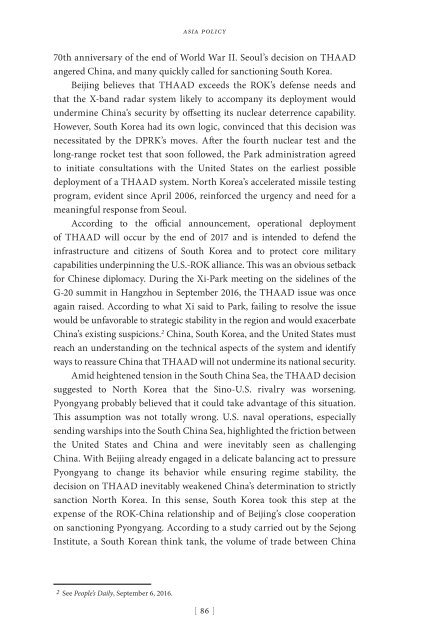2jBVKVf
2jBVKVf
2jBVKVf
Create successful ePaper yourself
Turn your PDF publications into a flip-book with our unique Google optimized e-Paper software.
asia policy<br />
70th anniversary of the end of World War II. Seoul’s decision on THAAD<br />
angered China, and many quickly called for sanctioning South Korea.<br />
Beijing believes that THAAD exceeds the ROK’s defense needs and<br />
that the X-band radar system likely to accompany its deployment would<br />
undermine China’s security by offsetting its nuclear deterrence capability.<br />
However, South Korea had its own logic, convinced that this decision was<br />
necessitated by the DPRK’s moves. After the fourth nuclear test and the<br />
long-range rocket test that soon followed, the Park administration agreed<br />
to initiate consultations with the United States on the earliest possible<br />
deployment of a THAAD system. North Korea’s accelerated missile testing<br />
program, evident since April 2006, reinforced the urgency and need for a<br />
meaningful response from Seoul.<br />
According to the official announcement, operational deployment<br />
of THAAD will occur by the end of 2017 and is intended to defend the<br />
infrastructure and citizens of South Korea and to protect core military<br />
capabilities underpinning the U.S.-ROK alliance. This was an obvious setback<br />
for Chinese diplomacy. During the Xi-Park meeting on the sidelines of the<br />
G-20 summit in Hangzhou in September 2016, the THAAD issue was once<br />
again raised. According to what Xi said to Park, failing to resolve the issue<br />
would be unfavorable to strategic stability in the region and would exacerbate<br />
China’s existing suspicions. 2 China, South Korea, and the United States must<br />
reach an understanding on the technical aspects of the system and identify<br />
ways to reassure China that THAAD will not undermine its national security.<br />
Amid heightened tension in the South China Sea, the THAAD decision<br />
suggested to North Korea that the Sino-U.S. rivalry was worsening.<br />
Pyongyang probably believed that it could take advantage of this situation.<br />
This assumption was not totally wrong. U.S. naval operations, especially<br />
sending warships into the South China Sea, highlighted the friction between<br />
the United States and China and were inevitably seen as challenging<br />
China. With Beijing already engaged in a delicate balancing act to pressure<br />
Pyongyang to change its behavior while ensuring regime stability, the<br />
decision on THAAD inevitably weakened China’s determination to strictly<br />
sanction North Korea. In this sense, South Korea took this step at the<br />
expense of the ROK-China relationship and of Beijing’s close cooperation<br />
on sanctioning Pyongyang. According to a study carried out by the Sejong<br />
Institute, a South Korean think tank, the volume of trade between China<br />
2 See People’s Daily, September 6, 2016.<br />
[ 86 ]


